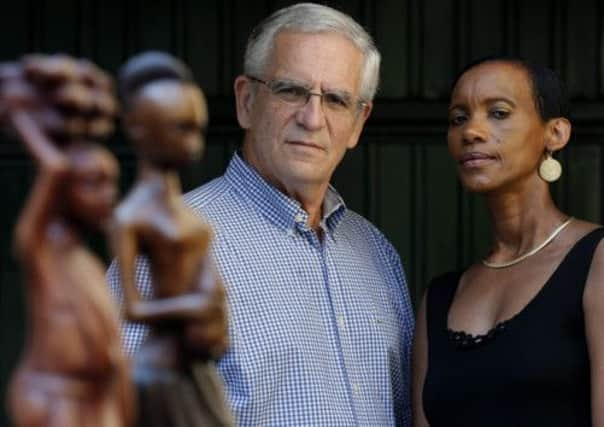Couple in hunt for Rwanda’s killers


The pair have spent a decade searching for dozens of suspected accomplices of the massacre in the east African country who have since been living in France.
France has now agreed to stage the first trial – of a 53-year-old former soldier accused of arming and guiding the killers.
Advertisement
Hide AdAdvertisement
Hide AdIt is a victory for the Gauthiers and could help relations between the two countries as they try to strengthen economic and diplomatic ties, although it could complicate them if the outcome does not please those Rwandans looking for justice.
“It’s a huge satisfaction,” Dafroza – a 59-year-old ethnic Tutsi whose mother was killed in the genocide directed by Hutu extremists – said of the landmark trial slated for next February. “But France really needs to speed up, because the witnesses are disappearing, and so are the killers.”
Dafroza Gauthier has deep personal reasons for wanting justice. But her quest is wrapped up in the wider rapprochement between Rwanda and France since the genocide, whose perpetrators President Paul Kagame once accused Paris of backing.
Rwanda is pleased that France is finally bringing suspects to trial but there is a risk the rapprochement could be set back if the trial results in a short sentence or acquittal.
Dafroza and Alain met in the early 1970s in Rwanda, where he went to teach French. A few years later, they met again by chance in France after she fled Rwanda to escape violence against Tutsis that was already simmering.
They got married and were raising a family in the north-east city of Reims, when full-scale genocide erupted in Rwanda.
More than 800,000 ethnic Tutsis and moderate Hutus were slaughtered during a three-month killing spree by Hutu extremists after the fatal downing of a plane carrying President Juvenal Habyarimana, who had favoured the Hutu ethnic group.
As the bodies stacked up, the Gauthiers realised they could not sit in their comfortable French home and do nothing.
Advertisement
Hide AdAdvertisement
Hide Ad“Her life is my life. Her family is my family. It’s also my family that has been assassinated,” said Alain, 64, sitting next to Dafroza in the small home office where they work on cases.
“We very quickly found ourselves looking into who was behind the massacres. This is a battle that has been imposed upon us and we’ll lead it as long as we have the strength to.”
The couple started taking notebooks on visits to Rwanda, collecting testimonies from survivors. It gradually dawned on them that many alleged accomplices of the killings were living lives of outward respectability in French cities such as Toulouse, Bordeaux, Lyon and Paris.
One high-profile suspect is Habyarimana’s widow, Agathe, whose extradition to Rwanda was refused by France but who lives in illegal limbo just outside Paris because her request for a residence permit was rejected.
Alain said others come across as pillars of society, for example as priests and doctors. “They try to be forgotten,” he said.
To date, they have filed, or have been involved with filing, some 20 legal complaints against alleged perpetrators. It has taken more than four years of judicial investigation for the first case to come to court – 20 years after the massacres.
“It’s very significant because the genocide suspects will no longer find the safe haven in France that they have today,” said Jacques Kabale, Rwanda’s ambassador to France.
Foreign Ministry spokesman Philippe Lalliot says France now sees Rwanda as an important partner with which it wants to develop ties further.
The next 12 months will test how far and how fast that process can advance.